NFU dismisses report blaming farming for more river pollution
 © Freeman83/Adobe Stock
© Freeman83/Adobe Stock The NFU has poured cold water on a new report from a consortium of wildlife groups, which points the finger at agriculture for increased chemical concentrations and declining invertebrate diversity in many English rivers.
The report, Chemical Pollution: The Silent Killer of UK Rivers has been published by the WildFish organisation in collaboration with the RSPB, Buglife and the Pesticide Collaboration, and is based on a survey of invertebrates in 12 rivers across England.
See also: Poultry producer pledges to help clean up River Wye
Aquatic invertebrates are a key indicator of a healthy ecosystem, and surveys assign a Species at Risk (Spear) score, the report explains.
It reveals that the number of sites assigned “poor” or “bad” scores has more than doubled compared with previous years, while in spring and autumn of 2021, numbers of riverfly species – mayflies, stoneflies and caddisflies – were significantly lower than in previous years.
The report concludes that chemical pollution, from sources such as agricultural pesticides and pharmaceuticals, is getting worse, adding that drought conditions increase the impact by reducing the dilution of chemicals.
Pollution solutions
The report makes a number of recommendations that could be adopted in the government’s upcoming Chemical Strategy, as follows.
- Ensure that the new Environmental Land Management schemes support farmers to reduce their reliance on pesticides and artificial fertilisers
- Invest in non-chemical alternatives
- Ensure that the “polluter pays” principle is upheld
- Maintain a precautionary approach to post-Brexit chemical approvals
- Commit to and resource a comprehensive river monitoring network and the enforcement of existing regulations.
Wildfish deputy chief executive Janina Gray said: “The upcoming Chemical Strategy is an opportunity to reverse the trend, but only if government steps up to the mark and acts now.”
NFU response
But the NFU has played down the significance of the report which, it said, failed to provide details of what is being measured and how.
“When looking for biodiversity trends there is little that can be concluded from data drawn from just a few years,” said senior regulatory affairs adviser Chris Hartfield.
“The report’s findings contrast with those emerging from the ChemPop research, which is looking at the impact of chemicals on wildlife populations using data from over 25 years, and the Species At Risk (Spear) metric used in the RSPB report, plus a full range of other biodiversity measures.
“ChemPop’s emerging results show that water quality is improving and the biodiversity and presence of sensitive river flies is significantly improving.”
He added that all farmers were committed to caring for the environment, including rivers, alongside producing sustainable, climate-friendly food for the nation.
